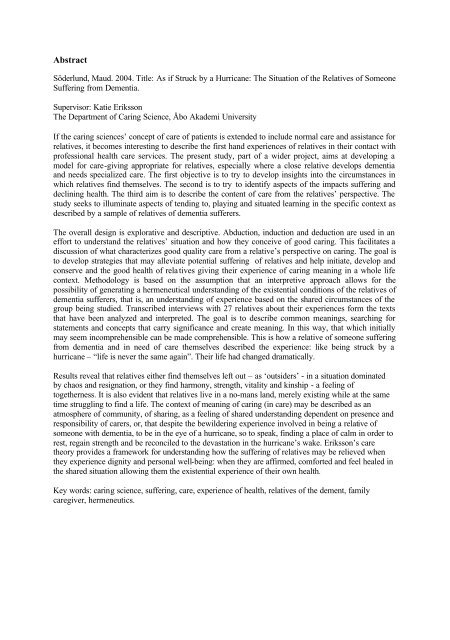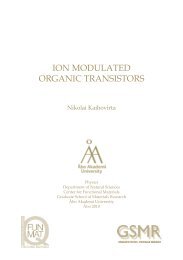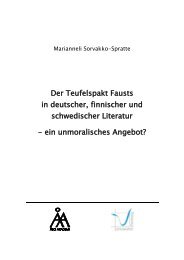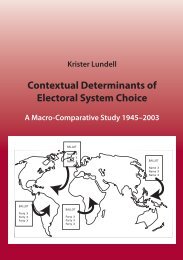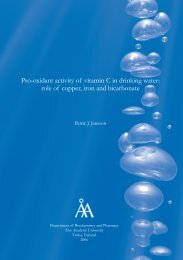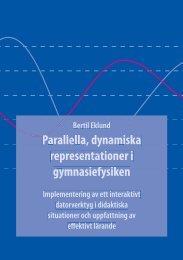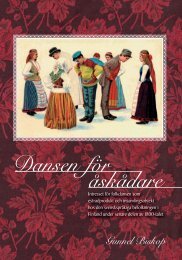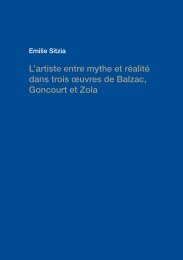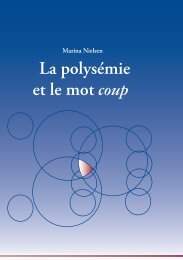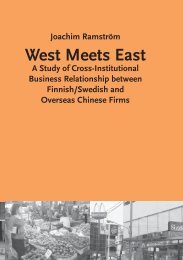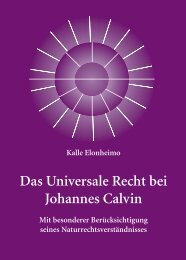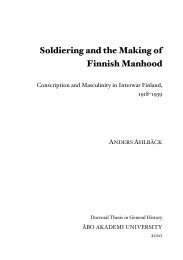Som drabbad av en orkan - Åbo Akademi
Som drabbad av en orkan - Åbo Akademi
Som drabbad av en orkan - Åbo Akademi
You also want an ePaper? Increase the reach of your titles
YUMPU automatically turns print PDFs into web optimized ePapers that Google loves.
Abstract<br />
Söderlund, Maud. 2004. Title: As if Struck by a Hurricane: The Situation of the Relatives of <strong>Som</strong>eone<br />
Suffering from Dem<strong>en</strong>tia.<br />
Supervisor: Katie Eriksson<br />
The Departm<strong>en</strong>t of Caring Sci<strong>en</strong>ce, <strong>Åbo</strong> <strong>Akademi</strong> University<br />
If the caring sci<strong>en</strong>ces’ concept of care of pati<strong>en</strong>ts is ext<strong>en</strong>ded to include normal care and assistance for<br />
relatives, it becomes interesting to describe the first hand experi<strong>en</strong>ces of relatives in their contact with<br />
professional health care services. The pres<strong>en</strong>t study, part of a wider project, aims at developing a<br />
model for care-giving appropriate for relatives, especially where a close relative develops dem<strong>en</strong>tia<br />
and needs specialized care. The first objective is to try to develop insights into the circumstances in<br />
which relatives find themselves. The second is to try to id<strong>en</strong>tify aspects of the impacts suffering and<br />
declining health. The third aim is to describe the cont<strong>en</strong>t of care from the relatives’ perspective. The<br />
study seeks to illuminate aspects of t<strong>en</strong>ding to, playing and situated learning in the specific context as<br />
described by a sample of relatives of dem<strong>en</strong>tia sufferers.<br />
The overall design is explorative and descriptive. Abduction, induction and deduction are used in an<br />
effort to understand the relatives’ situation and how they conceive of good caring. This facilitates a<br />
discussion of what characterizes good quality care from a relative’s perspective on caring. The goal is<br />
to develop strategies that may alleviate pot<strong>en</strong>tial suffering of relatives and help initiate, develop and<br />
conserve and the good health of rela tives giving their experi<strong>en</strong>ce of caring meaning in a whole life<br />
context. Methodology is based on the assumption that an interpretive approach allows for the<br />
possibility of g<strong>en</strong>erating a herm<strong>en</strong>eutical understanding of the exist<strong>en</strong>tial conditions of the relatives of<br />
dem<strong>en</strong>tia sufferers, that is, an understanding of experi<strong>en</strong>ce based on the shared circumstances of the<br />
group being studied. Transcribed interviews with 27 relatives about their experi<strong>en</strong>ces form the texts<br />
that h<strong>av</strong>e be<strong>en</strong> analyzed and interpreted. The goal is to describe common meanings, searching for<br />
statem<strong>en</strong>ts and concepts that carry significance and create meaning. In this way, that which initially<br />
may seem incompreh<strong>en</strong>sible can be made compreh<strong>en</strong>sible. This is how a relative of someone suffering<br />
from dem<strong>en</strong>tia and in need of care themselves described the experi<strong>en</strong>ce: like being struck by a<br />
hurricane – “life is never the same again”. Their life had changed dramatically.<br />
Results reveal that relatives either find themselves left out – as ‘outsiders’ - in a situation dominated<br />
by chaos and resignation, or they find harmony, str<strong>en</strong>gth, vitality and kinship - a feeling of<br />
togetherness. It is also evid<strong>en</strong>t that relatives live in a no-mans land, merely existing while at the same<br />
time struggling to find a life. The context of meaning of caring (in care) may be described as an<br />
atmosphere of community, of sharing, as a feeling of shared understanding dep<strong>en</strong>d<strong>en</strong>t on pres<strong>en</strong>ce and<br />
responsibility of carers, or, that despite the bewildering experi<strong>en</strong>ce involved in being a relative of<br />
someone with dem<strong>en</strong>tia, to be in the eye of a hurricane, so to speak, finding a place of calm in order to<br />
rest, regain str<strong>en</strong>gth and be reconciled to the devastation in the hurricane’s wake. Eriksson’s care<br />
theory provides a framework for understanding how the suffering of relatives may be relieved wh<strong>en</strong><br />
they experi<strong>en</strong>ce dignity and personal well-being: wh<strong>en</strong> they are affirmed, comforted and feel healed in<br />
the shared situation allowing them the exist<strong>en</strong>tial experi<strong>en</strong>ce of their own health.<br />
Key words: caring sci<strong>en</strong>ce, suffering, care, experi<strong>en</strong>ce of health, relatives of the dem<strong>en</strong>t, family<br />
caregiver, herm<strong>en</strong>eutics.


